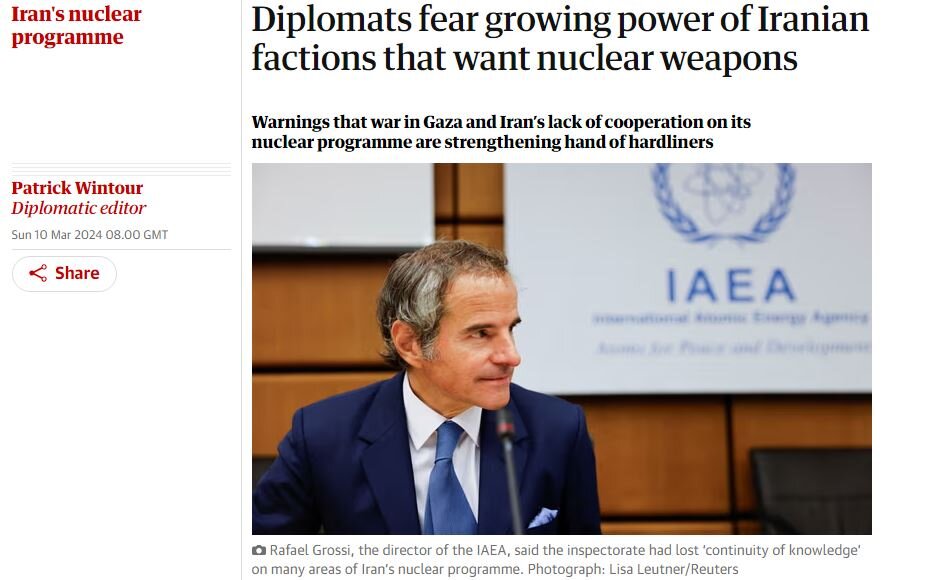Masking injustice

TEHRAN- The Guardian appears to have embarked upon a strategic narrative endeavor: injecting an aura of urgency into Iran's nuclear program.
However, this endeavor appears not merely as an exercise in journalistic analysis, but rather as a concerted effort to frame Iran's nuclear ambitions as an imminent threat to global stability, thus diverting attention away from the grave humanitarian crisis unfolding in Gaza under the guise of Israeli military operations.
Published on March 10, the Guardian's report meticulously amplifies the specter of Iran's nuclear pursuits, positioning them as a looming peril that demands immediate international attention.
Asserting that "growing fears among diplomats in the U.S. and Europe" are fueled by Iran's ostensibly unchecked nuclear program and the turbulence stemming from the Gaza conflict, the article insinuates a nexus between these disparate issues. Such insinuations effectively serve to fortify the narrative that Iran's nuclear aspirations pose an existential danger to the international community, conveniently overshadowing the reprehensible atrocities perpetrated by the Israeli military in Gaza.
Curiously, one might ponder the timing of The Guardian's editorial emphasis on Iran's nuclear program. Against the backdrop of the glaringly conspicuous Gaza crisis, replete with reports of egregious human rights violations and mounting civilian casualties at the hands of Israeli forces, as well as the ongoing geopolitical tensions surrounding the Russia-Ukraine conflict, the fixation on Iran's nuclear activities appears incongruous at best.
Indeed, the exigencies of the moment dictate a more discerning allocation of journalistic resources. With the world's attention riveted on the harrowing plight of Gazan civilians, the imperative to hold the Israeli government accountable for its flagrant disregard of international law and human rights norms assumes paramount importance. Similarly, the escalating tensions between Russia and Ukraine underscore the pressing need for a concerted diplomatic effort to de-escalate hostilities and avert a full-blown humanitarian catastrophe in Eastern Europe.
By conspicuously spotlighting Iran's nuclear program amidst these pressing global crises, The Guardian risks inadvertently perpetuating a narrative that conveniently aligns with the geopolitical interests of certain actors. Rather than succumb to the allure of sensationalism, responsible journalism demands a sober appraisal of the multifaceted challenges confronting the international community. In doing so, media outlets can fulfill their mandate as watchdogs of democracy, holding power to account and fostering a more informed public discourse on matters of global significance.
Exploring The Guardian's editorial agenda
The British newspaper, in what appears to be a multifaceted maneuver, has orchestrated a narrative aimed at several objectives: painting Iran's nuclear program as a global menace, obscuring the atrocities of the Israeli military campaign in Gaza, diverting attention from the West's apparent reluctance to salvage the Joint Comprehensive Plan of Action (JCPOA), and subtly casting doubt on Iran's recent electoral process.
At the forefront of this editorial strategy lies a concerted effort to portray Iran's nuclear endeavors as a looming threat to international security. However, recent statements from Iran's envoy to the International Atomic Energy Agency (IAEA), Mohsen Naziri Asal, shed light on a different perspective. His remarks on March 8 underscored the pivotal role of specific actions by the United States and the European Troika in reviving the JCPOA. He elucidated on the Vienna negotiations, highlighting Iran's constructive engagement following the U.S.'s expressed willingness to rejoin the nuclear accord and lift sanctions. Despite these overtures, the protracted nature of the negotiations is largely attributed to the United States' lack of political resolve.
The Guardian's narrative, amplifying Iran's nuclear activities as a global menace, serves to sway public opinion against Tehran, subtly framing its peaceful nuclear pursuits as inherently perilous. Concurrently, the newspaper's conspicuous silence on the Israeli military's brutal campaign in Gaza raises questions about its editorial priorities.
The wanton destruction and loss of innocent lives in Gaza, reminiscent of some of history's darkest chapters, seem to be eclipsed by the Guardian's focus on Iran's nuclear program.
This selective editorial stance raises ethical concerns, particularly given the magnitude of suffering endured by Gazans under Israeli occupation.
Moreover, The Guardian's scrutiny of Iran's recent parliamentary elections, characterized by a purportedly low turnout and allegations of manipulation, appears to be a thinly veiled attempt to impugn Iran's electoral integrity. By juxtaposing these domestic political dynamics with Iran's nuclear activities, the newspaper subtly advances a narrative that aligns with Western media propaganda. However, such editorial maneuvers risk oversimplifying complex geopolitical realities and neglecting the broader context within which Iran's political landscape operates.
In conclusion, The Guardian's editorial choices underscore the intricate interplay between media narratives, geopolitical interests, and ethical considerations. By prioritizing certain narratives over others, the newspaper wades into contentious terrain, shaping public perceptions and influencing global discourse. However, in doing so, it must navigate the fine line between journalistic integrity and ideological bias, ensuring a nuanced and balanced portrayal of complex geopolitical issues.
Leave a Comment